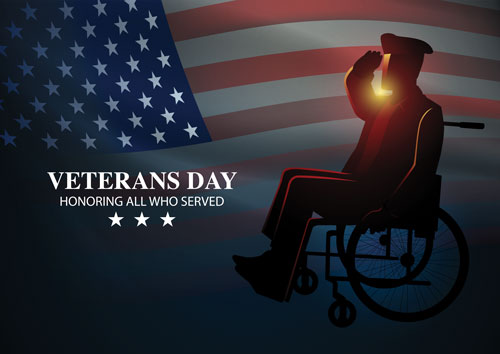Veterans Day is upon us!
Every Veterans Day, we take time to recognize the brave men and women who’ve served in the U.S. military. It’s also a day to honor disabled veterans – individuals who returned home from warzones with debilitating injuries, both physical and psychological.
The U.S. Bureau of Labor Statistics (BLS) reports that in August 2024, approximately 5.5 million veterans, or 31%, had a service-connected disability. Vets live with a wide range of physical injuries like limb loss, burns and spinal cord damage. Others face invisible conditions like post-traumatic stress disorder (PTSD), traumatic brain injury (TBI), or chronic pain.
On top of that, disabled veterans are more likely to face problems like homelessness, unemployment, food insecurity, substance use disorders and isolation than non-veterans and non-disabled veterans alike.
How can we help? Here are some suggestions:
1. Hire a disabled vet
Disabled veterans have already demonstrated determination, adaptability, leadership and problem-solving capabilities and resilience. They can bring all those desirable qualities to your workplace. Additionally, employers that hire disabled vets may be entitled to financial incentives through programs such as the Work Opportunity Tax Credit (WOTC); the Disabled Access Credit and the Special Employer Incentive Program (SEI).
2. Support accessible housing and transportation
Many disabled veterans need homes that accommodate mobility devices or medical equipment as well as help with transportation to jobs, school or shopping. You can support groups that help with those services. Homes For Our Troops; Habitat for Humanity’s Veterans Build; Gary Sinise Foundation; Mercy Medical Angels — Angel Wings for Veterans; and Veterans Transportation and Community Living Initiative (VTCLI) are just a few of the many options.
3. Show up for veterans
It’s wonderful to thank a disabled veteran for their service. How about putting your gratefulness into action? Consider volunteering with a veterans organization or VA hospital; attending a Veterans Day parade; or participating in a community arts project that honors vets. For example, the Patriot Art Foundation and the U.S. Veterans’ Artists Alliance offer art exhibitions, films and other programs that are open to the public.
4. Learn about available resources
Educate yourself about resources for vets with mental health issues, such as free or sliding scale mental health clinics, food pantries, financial and legal support services and emergency hotlines for veterans. Here are just a few options along these lines: Veterans Crisis Line: Dial 988, then press 1 or text 838255 (available 24/7); Make the Connection— a VA site featuring real veteran stories and treatment options.
5. Encourage Adaptive Sports and Recreation
Adaptive sports empower veterans to rebuild confidence and community through movement and competition. You can volunteer at local adaptive sports events, donate gear, or sponsor an athlete. Or you can spread awareness on social media. Programs like the VA’s Adaptive Sports Program, Team Red, White & Blue; and the Invictus Games give disabled veterans the chance to connect, stay active, and rediscover the joy of movement.
6. Keep up the momentum
Don’t limit your support for our disabled veterans to November 11. Make it part of your life!


